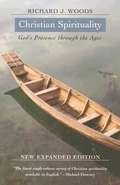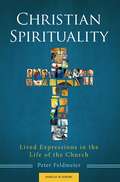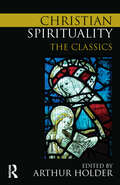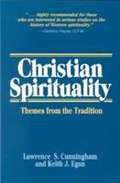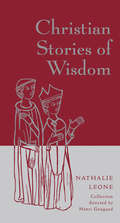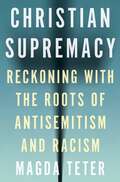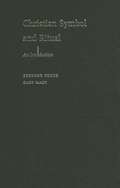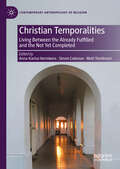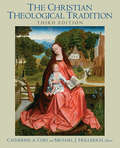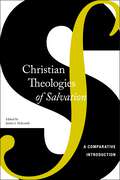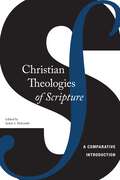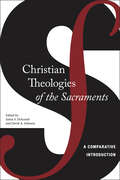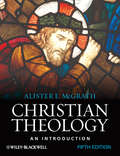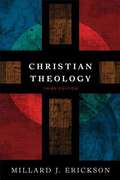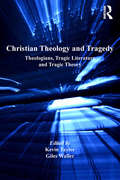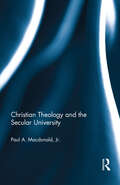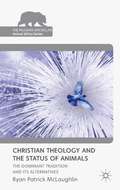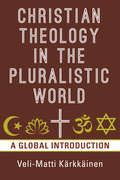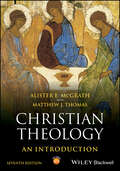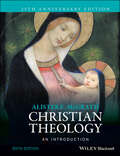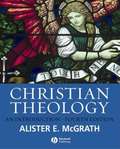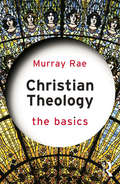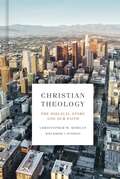- Table View
- List View
Christian Spirituality: God's Presence through the Ages
by Richard J. WoodsA brief and non-technical account of the development of Christian Spirituality in its social and historical context.
Christian Spirituality: Lived Expressions in the Life of the Church
by Peter FeldmeierThe term spirituality is often used ambiguously. Bookstores have sections dedicated to "spiritual texts," which include everything from tips for improving one's business acumen and marital communication to translations of ancient tantric poetry and primers on the discernment of spirits. Given this diversity, what does spirituality actually mean--especially for the Christian tradition? <P><P>In Christian Spirituality: Lived Expressions in the Life of the Church, Peter Feldmeier weaves together historical, theological, and experiential anecdotes and information to produce a portrait of the diverse spiritual traditions that have come to bear on Christianity through the lived witness of Christian believers. With instructive chapter introductions, review and discussion questions at the conclusion of each topic, a robust bibliography, and a straightforward chronological method, Christian Spirituality makes the diverse topic of spirituality at once comprehensive and accessible.
Christian Spirituality: The Classics
by Arthur HolderChristian Spirituality: The Classics is a unique and comprehensive guide to thirty key Christian spirituality texts. Ranging from Origen and Augustine to Jonathan Edwards, Thérèse of Lisieux and Thomas Merton, it offers a view of the texts which is founded in scholarship, but which also presents them as living documents that invite- even compel -contemplative reflection and existential response. Each chapter briefly describes the classic text's author and audience, gives a synopsis of its contents, suggests some of its influence in history, and then explores aspects of the text's meaning for readers today. Key themes include: What is the meaning of life? How can human beings find truth? How can they discover who they really are? How can they live together in peace? How can they live more fully in God's presence in this world and be united with God in the world to come? The scholars who have written these chapters are all experts on their respective topics, but they wear their learning lightly. Anyone wishing to discover the riches of Christian spirituality will find this the ideal introduction and should be able to progress to a deeper understanding of the texts themselves.
Christian Spirituality: The Classics
by Arthur HolderChristian Spirituality: The Classics is a unique and comprehensive guide to thirty key Christian spirituality texts. Ranging from Origen and Augustine to Jonathan Edwards, Thérèse of Lisieux and Thomas Merton, it offers a view of the texts which is founded in scholarship, but which also presents them as living documents that invite- even compel -contemplative reflection and existential response. Each chapter briefly describes the classic text’s author and audience, gives a synopsis of its contents, suggests some of its influence in history, and then explores aspects of the text’s meaning for readers today. Key themes include: What is the meaning of life? How can human beings find truth? How can they discover who they really are? How can they live together in peace? How can they live more fully in God’s presence in this world and be united with God in the world to come? The scholars who have written these chapters are all experts on their respective topics, but they wear their learning lightly. Anyone wishing to discover the riches of Christian spirituality will find this the ideal introduction and should be able to progress to a deeper understanding of the texts themselves.
Christian Spirituality: Themes From The Tradition
by Lawrence S. Cunningham Keith J. EganChristian Spirituality is a concise and accessible overview of the ways Christians over the centuries have approached God in prayer and practice. In ten chapters, Lawrence Cunningham and Keith Egan explain the dynamics of spiritual life, each chapter exploring a single theme such as scripture, journeying, meditation & contemplation, asceticism, mysticism, solitude & community, friendship, eucharist. The themes are not mutually exclusive since believers frequently embrace several or all of these "ways" at once. But in different times and places people have tended to focus on one or another, so that they have become discernible paths to the Holy. The authors explore each theme in depth, tracing its evolution over the centuries. Within this historical framework, the book provides the reader with a "taste" of the different ways Christians have sought or lived in the presence of God. Each chapter concludes with a list of selected works for further reading and with exercises intended to provide a personal experience of the "way".
Christian Stories of Wisdom
by Nathalie LeoneA beautifully illustrated collection of old-world Christian tales of faith and morality. Christian Stories of Wisdom is the perfect antidote to our busy, modern lives. It serves as a daily companion that one can return to again and again for a moment of spiritual sustenance. The 70 stories in this uplifting collection can be read in solitude or shared with others. Among them are "Saint Francis and the Wolf," "Saint Peter's Mother," "The Mantle of Christ," "The Angel and the Hermit," and many others. Nathalie Leone has been an actress, mask creator, puppeteer, and storyteller. Along with her career in the performing arts, she is the author of Souffle, a collection of poems, and several children's stories. She lives in France.
Christian Supremacy: Reckoning with the Roots of Antisemitism and Racism
by Magda TeterA panoramic cultural and legal history that traces the roots of antisemitism and racism to early Christian theologySince the earliest days of Christianity, theologians expressed pervasive anxiety about Jews as equal members of society, and, with European expansion in the early modern period, that anxiety extended to people of color. This troubling legacy still haunts us today. Christian Supremacy demonstrates how theological and legal frameworks created by the church centuries ago laid the seeds of antisemitism and anti-Black racism and reveals why Christian identity lies at the heart of the world’s violent white supremacy movements.In a powerful historical narrative spanning nearly two millennia, Magda Teter describes how Christian theology of late antiquity cast Jews as “children born to slavery,” and how the supposed theological inferiority of Jews became inscribed into law, creating tangible structures that reinforced a sense of Christian domination and superiority. With the dawn of European colonialism, a distinct brand of European Christian supremacy found expression in the legally sanctioned enslavement and exploitation of people of color, later taking the form of white Christian supremacy in the New World.Drawing on a wealth of primary evidence ranging from the theological and legal to the philosophical and artistic, Christian Supremacy is a profound reckoning with history that traces the roots of the modern rejection of Jewish and Black equality to an enduring Christian heritage of exclusion, intolerance, and persecution.
Christian Symbol And Ritual: An Introduction
by Bernard J. Cooke Gary MacyIn Christian Symbol and Ritual, Bernard Cooke and Gary Macy offer an accessible and engaging introduction to the topic written from a non-denominational perspective. Cooke and Macy demonstrate that celebration, ritual, and symbol are already central to our lives, even though most do not seetheir actions as symbolic or ritualistic. They connect central Christian symbols to the symbols and rituals already present in everyday life and place Christian theology in a familiar context. After discussing the characteristics and functions of rituals, they explore different kinds of ritual,including those of friendship, worship, and healing. The authors also examine such questions as how rituals establish and maintain power relationships, how "official" rituals are different from "popular" Christian rituals and devotions, and how Christian rituals function in the process of humansalvation. Christian Symbol and Ritual is an invaluable resource for students, teachers, and lay readers.
Christian Temporalities: Living Between the Already Fulfilled and the Not Yet Completed (Contemporary Anthropology of Religion)
by Simon Coleman Matt Tomlinson Anna-Karina HermkensThis volume explores how different forms of Christianity shape people's visions of pasts and futures, and how the transcendent is brought into human time. Beyond conventional discussions around breaks with the past in Christian conversion and future ruptures announced in prophecy, the volume reveals previously unexplored ways in which Christians work with concepts of time and its articulation with divinity, subjectivity, agency, and personal, social, and political change. By developing Coleman’s argument about “historiopraxy” in novel directions, contributors provide new understandings of religious temporalities and the ritual articulation of immanence and transcendence. While building upon previous scholarly work in the anthropology of Christianity, this volume pushes the debate further and provides original insights into how religion is mobilised to shape and transform people's pasts, presents and futures.
Christian Theological Tradition
by Catherine Cory Michael HollerichThis text helps students acquire a basic theological literacy in key persons and events of the Bible and the Christian faith, and in Christianity's encounter with culture at large. Historically arranged, it also addresses five major themes of systematic theology: revelation, God, creation, Jesus, and church.
Christian Theologies of Salvation: A Comparative Introduction
by Justin S HolcombEssays exploring pivotal spiritual figures over two millennia and their doctrines of salvation. Salvation has been a key focus of Christian theology since the first days of the church. Theologians from St. Augustine to Karl Barth have debated the finer points of salvation for nearly as long, offering a bewildering array of competing and often contradictory theories. Christian Theologies of Salvation traces doctrines of salvation from the first century into the twenty-first century. Each chapter focuses on a different major theologian, first presenting the theologian&’s doctrine of salvation, then highlighting how the doctrine makes a distinct contribution to the church&’s overall dogma. The volume offers a comparative focus, including doctrines of salvation that reflect the historical development of Catholic, Orthodox, and Protestant views. By illuminating the ways in which doctrines of salvation have evolved over the church&’s history, Justin Holcomb takes us across the teachings of Origen and Augustine, John Calvin and Martin Luther, and eventually to the more modern theologies of Karl Barth and Gustavo Gutiérrez. A much-needed map to the options and implications of different theologies of salvation, this book is essential reading for students and scholars of Christian thought. &“Holcomb has assembled a fine group of scholars to look at four major periods, patristic, Middle Ages, Reformation and Catholic Counter-Reformation, and the 18th to 21st centuries . . . [A] solid study of important voices on Christian salvation.&” ―Choice &“An important tool in helping theological students and pastors explore their own theological tradition while at the same time prompting deeper conversations with ecumenical partners.&” —Paul Galbreath, Union Presbyterian Seminary
Christian Theologies of Scripture: A Comparative Introduction
by Justin S. HolcombAll religious traditions that ground themselves in texts must grapple with certain questions concerning the texts' authority. Yet there has been much debate within Christianity concerning the nature of scripture and how it should be understood—a debate that has gone on for centuries.Christian Theologies of Scripture traces what the theological giants have said about scripture from the early days of Christianity until today. It incorporates diverse discussions about the nature of scripture, its authority, and its interpretation, providing a guide to the variety of views about the Bible throughout the Christian tradition.Preeminent scholars including Michael S. Horton, Graham Ward, and Pamela Bright offer chapters on major figures in the pre-modern, reformation, and early modern eras, from Origen and Aquinas to Luther and Calvin to Barth and Balthasar. They illuminate each thinker's understanding of the Christian scriptures and their views on interpreting the Bible. The book also includes overview chapters to orient readers to the key questions regarding scripture in each era, as well as chapters on scripture and feminism, scripture in the African American Christian tradition, and scripture and postmodernism.This volume will be indispensable reading for students and all those interested in the nature and authority of Christian scripture.
Christian Theologies of the Sacraments: A Comparative Introduction
by Justin S. Holcomb David A. JohnsonDelves into the ancient debate regarding the nature and purpose of the seven sacraments What are the sacraments? For centuries, this question has elicited a lively discussion and among theologians, and a variety of answers that do anything but outline a unified belief concerning these fundamental ritual structures. In this extremely cohesive and well-crafted volume, a group of renowned scholars map the theologies of sacraments offered by key Christian figures from the Early Church through the twenty-first century. Together, they provide a guide to the variety of views about sacraments found throughout Christianity, showcasing the variety of approaches to understanding the sacraments across the Catholic, Protestant, and Orthodox faith traditions. Chapters explore the theologies of thinkers from Basil to Aquinas, Martin Luther to Gustavo Gutiérrez. Rather than attempting to distill their voices into a single view, the book addresses many of the questions that theologians have tackled over the two thousand year history of Christianity. In doing so, it paves the way for developing theologies of sacraments for present and future contexts. The text places each theology of the sacraments into its proper sociohistorical context, illuminating how the church has used the sacraments to define itself and its congregations over time. The definitive resource on theologies of the sacraments, this volume is a must-read for students, theologians, and spiritually interested readers alike.
Christian Theology
by Alister E. McgrathAlister McGrath's Christian Theology: An Introduction is one of the most internationally-acclaimed and popular Christian theology textbooks in use today. This 5th edition has been completely revised, and now features new and extended material, numerous additional illustrations, and companion resources, ensuring it retains its reputation as the ideal introduction to Christian theology.Fully updated 5th edition of the bestselling textbook, incorporating expanded material, numerous student features and new illustrations Features new sections on Copernicanism and Darwinism Includes extended discussions of Augustine's doctrine of creation, Trinitarian theologies of religion, and the relation of Christianity to other faiths May be used as a stand-alone volume, or alongside the Christian Theology Reader, 4th edition for a complete overview of the subject Retains the chapter structure of the 4th edition, ensuring comparability with earlier editions and courses based on these Accompanied by a revised instructor's website featuring expanded resources including study questions and answers; visit www.wiley.com/go/mcgrath for more details and to register for access
Christian Theology
by Millard J. EricksonLeading evangelical scholar Millard Erickson offers a new edition of his bestselling textbook, now substantially updated and revised throughout. This edition takes into account feedback from professors and students and reflects current theological conversations, with added material on the atonement, justification, and divine foreknowledge. Erickson's comprehensive introduction is biblical, contemporary, moderate, and fair to various positions, and it applies doctrine to Christian life and ministry.
Christian Theology and Tragedy: Theologians, Tragic Literature and Tragic Theory (Routledge Studies in Theology, Imagination and the Arts)
by Kevin Taylor Giles WallerDrawing together leading scholars from both theological and literary backgrounds, Christian Theology and Tragedy explores the rich variety of conversations between theology and tragedy. Three main areas are examined: theological readings of a range of tragic literature, from plays to novels and the Bible itself; how theologians have explored tragedy theologically; and how theology can interact with various tragic theories. Encompassing a range of perspectives and topics, this book demonstrates how theologians can make productive use of the work of tragedians, tragic theorists and tragic philosophers. Common misconceptions - that tragedy is monolithic, easily definable, or gives straightforward answers to theodicy - are also addressed. Interdisciplinary in nature, this book will appeal to both the theological and literary fields.
Christian Theology and the Secular University
by Paul A. Macdonald, Jr.If the secular university by definition is non-sectarian or non-denominational, then how can it accommodate a discipline like Christian theology? Doesn’t the traditional goal of theological study, which is to attain knowledge of the divine, fundamentally conflict with the main goal of secular academic study, which is to attain knowledge about ourselves and the world in which we live? So why should theology be admitted, or even care about being admitted, into secular academic life? And even if theology were admitted, what contribution to secular academic life could it make? Working from a Christian philosophical and theological perspective but also engaging a wide range of theologians, philosophers, and religious studies scholars, Christian Theology and the Secular University takes on these questions, arguing that Christian theology does belong in the secular university because it provides distinct resources that the secular university needs if it is going to fulfill what should be its main epistemic and educative ends. This book offers a fresh and unique perspective to scholars working in the disciplines of theology, philosophy, and religious studies, and to those in other academic disciplines who are interested in thinking critically and creatively about the place and nature of theological study within the secular university.
Christian Theology and the Status of Animals
by Ryan Patrick MclaughlinThe author argues that there are conflicting traditions with regard to the question of what is the moral standing of animals according to Christianity. The dominant tradition maintains that animals are primarily resources but there are alternative strands of Christian thought that challenge this view.
Christian Theology in the Pluralistic World: A Global Introduction
by Veli-Matti KärkkäinenKärkkäinen&’s acclaimed five-volume constructive theology abridged in one accessible volumeProviding a new and unique way of doing theology in our pluralistic world, Veli-Matti Kärkkäinen presents historic Christian doctrines in relation to the natural sciences and four other living faiths—Judaism, Islam, Buddhism, and Hinduism. This textbook covers all systematic topics along with a host of current issues such as violence, colonialism, inclusivity, sociopolitical liberation, environmental care, and more.Accessible and student-friendly, Christian Theology in the Pluralistic World is the ideal text for exploring a theological vision at once rooted in the Christian tradition and constructive in its engagement with the complexities of our global, pluralistic world.
Christian Theology of Public Policy: Highlighting the American Experience
by John M. CobinShould you read this book? Perhaps you are a Christian who believes or suspects that today's public policies are wrong, or at least harmful to Christians. You would like to understand better what the Bible, informed by logic, history, economics, and political science, teaches about citizenship and what kind of society is best for Christians. If so, you will find this book interesting and useful.
Christian Theology: An Introduction
by Alister E. McGrath Matthew J. ThomasOffers a lively, concise, and easily accessible approach to the development of Christianity’s core themes over the centuries As Christianity enters into a new phase of expansion, the study of Christian theology continues to play a key role in modern intellectual culture, as well as to those wanting to understand the central issues and preoccupations of the Middle Ages, the European Reformation, or many other periods in human history. Since its initial publication more than 30 years ago, Christian Theology: An Introduction has established itself as one of the most respected and widely used theological textbooks. Now in its seventh edition, this classic textbook remains an unparalleled introduction to the primary concepts, themes, and developments of 2,000 years of Christian thought. Designed for students with no prior knowledge of the subject, Christian Theology provides an overview of historical theology, explains central aspects of philosophical theology, describes major debates over Christian theological method, and explores key doctrines of systematic theology. Theologically neutral chapters offer balanced coverage of Catholic, Orthodox, Protestant, and evangelical traditions, positions, perspectives, and insights. In this new edition, renowned theologian Alister E. McGrath is joined by educationalist Matthew J. Thomas to ensure that Christian Theology connects with a range of contemporary teaching contexts. Reviewed and improved content is supported by an entirely new series of fifteen lectures on Christian theology written and presented by Professor McGrath. Christian Theology: An Introduction, Seventh Edition, remains the ideal textbook for university courses in Christian theology, seminary courses across denominations, church discussion groups, adult Sunday schools, and those looking for a reliable guide to the study of Christian thought.
Christian Theology: An Introduction (Coursesmart Ser.)
by Alister E. McGrathCHRISTIAN THEOLOGY “The genius of Alister E. McGrath is his remarkable ability to write in a clear, concise, and lucid manner that draws both teachers and students to participate with the great thinkers of the Christian tradition, past and present. Education and illumination are the abundant fruits of this massive, well-organized text, which is sure to appeal to a wide range of Protestant, Catholic, and Orthodox audiences. For this we are indebted to the author.” Dennis Ngien, Professor of Systematic Theology, Tyndale University College and Seminary, Toronto, Canada “For sheer comprehensiveness, clarity, and coherence, Alister McGrath has produced the definitive textbook. Always accurate and engaging, students are gently introduced to the gift of Theology in a memorable way.” Ian S. Markham, Dean and President of Virginia Theological Seminary Praise for the fifth edition “Alister McGrath has proven himself a master at engagingly and simply introducing Christian theology in all of its contested complexity. All who work at the critical appropriation of the theological tradition stand in debt to McGrath.” M. Douglas Meeks, Cal Turner Chancellor Professor of Theology and Wesleyan Studies, Vanderbilt University Divinity School Now celebrating its 25th year of publication, Christian Theology is one of the most internationally acclaimed textbooks in this area today. Completely rewritten for the sixth edition, it remains the ideal introduction to the beliefs and interpretation of Christianity. It is specifically designed for students with no prior knowledge, presenting the primary themes and debates of Christian theology with clarity and historical context. This new edition retains all the elements that have made it so successful while also including significant additions and developments. There is an increased discussion of contemporary theology to complement the excellent coverage of historical material. Important new information has also been added, in areas such as the Holy Spirit, contemporary non-Western theologies, and feminist voices in Christian theology. The text is rich in pedagogy to encourage student learning, featuring a two colour design, glossary, end-of-chapter discussion questions, and much more. Written by renowned theologian Alister E. McGrath, this classic text is a clear, lively and concise introduction that provides instructors with the tools they need to engage with their students on Christian theology.
Christian Theology: An Introduction (Fourth Edition)
by Alister E. McgrathFrom the book: This book aims to introduce you to the basics of Christian theology. It assumes that you know nothing about the subject. It introduces and explains the following aspects of Christian theology: its leading ideas; how those ideas are developed and defended; its basic vocabulary, especially technical terms; the key debates that have influenced Christian thinking during the last two thousand years; the leading thinkers who have shaped Christian theology down the centuries. After you have worked through this book, you will be able to achieve the following objectives: read and understand more advanced works of theology, including works by major theologians, and works about major theologians or areas of theology; benefit from the growing body of theological material on the Internet - some of which is identified in the "Theological Resources on the Internet" section of the dedicated website linked to this book; make sense of lectures and talks dealing with Christian theology; make informed contributions to debates and discussions in churches, universities, seminaries, and colleges; give accurate and reliable introductory presentations to church and student audiences on many aspects of Christian thought. ... This is an excellent reference for the beginning student as well as the experienced minister.
Christian Theology: The Basics (The Basics)
by Murray RaeChristian Theology: The Basics is a concise introduction to the nature, tasks and central concerns of theology – the study of God within the Christian tradition. Providing a broad overview of the story that Christianity tells us about our human situation before God, this book will also seek to provide encouragement and a solid foundation for the reader’s further explorations within the subject. With debates surrounding the relation between faith and reason in theology, the book opens with a consideration of the basis of theology and goes on to explore key topics including: The identity of Jesus and debates in Christology The role of the Bible in shaping theological inquiry The centrality of the Trinity for all forms of Christian thinking The promise of salvation and how it is achieved. With suggestions for further reading at the end of each chapter along with a glossary Christian Theology: The Basics, is the ideal starting point for those new to study of theology.
